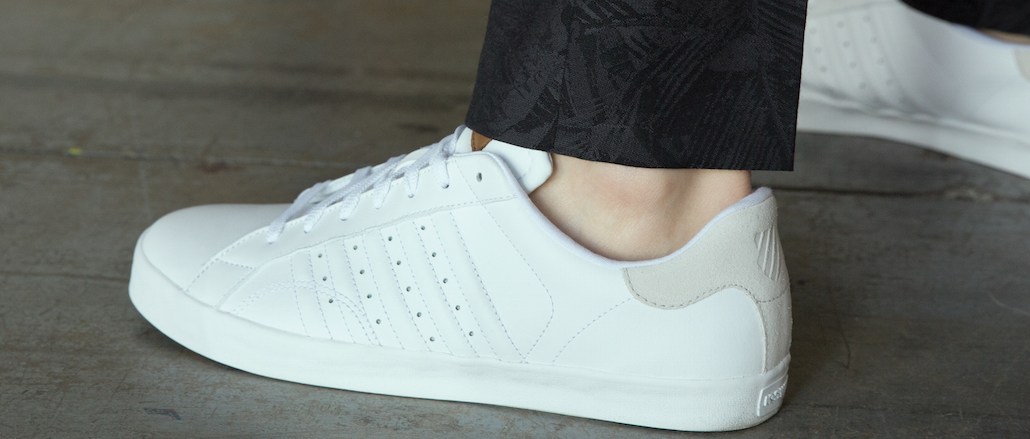Secure your place at the Digiday Media Buying Summit in Nashville, March 2-4

This is ThinkTank, a series in which we quiz brand chiefs and CMOs on where the industry is heading.
If you stopped wearing your K-Swiss sometime around 2002, apparently you’re not alone.
Late last year, the nearly-forgotten footwear brand started a campaign to reintroduce itself to the 21st century. The comeback was complete with a Kik campaign, a campaign called “The Board” that crowdsourced creative, and a little help from producer-deejay Diplo. Digiday talked to K-Swiss CMO Barney Waters about the internal mechanics of a brand refresh, the crowdsourcing campaign and its plans for mobile retail.
The transcript below has been edited for length and clarity.
Where does a brand refresh begin?
It starts with the organization and the company culture. We look to this as a rebuild from top to bottom. All that sort of stuff had to happen before we even started on the product or marketing.

Tell me more about the internal changes.
The old K-Swiss was like the DMV. It was set in its ways. We actually physically knocked walls down in the building to create more collaborative environments. We’ve brought a lot of new talent in. The teams are working together like never before. Not only between departments, but globally. Before, Asia, Europe and the Americas almost operated independently as three regions. Now it’s one global team and voice.
How did marketing fit in?
It starts with creating a brand purpose and a foundation. We had to do something that the other big sneaker brands weren’t doing, because we have some very big, strong brands in our space.
So how do you stand out in that environment?
We found that there’s a new aspiration among young people. The idea that everyone wants to be Michael Jordan is a little old-fashioned at this point. And it’s also owned by other brands. We’re not going to win if we try to sign athletes. We found that young people want to be entrepreneurs more than celebrities or athletes. We say K-Swiss is about inspiring and outfitting the next generation of entrepreneurs.
How is that expressed in your marketing?
“The Board.” We wanted to find 100 of the most energetic, connected young people with entrepreneurial spirit and have them rebuild the brand with us. We put them through an online curriculum where experts talked about things like product design, taglines and social media. Each board member would complete a task and the best ones we would use in real life and pay. We’ve actually ended up engaging with the board members beyond the curriculum. We had one create a Vine for our latest product release. We have photographers on the team and we reached out to one to shoot some imagery for a collaboration with Urban Outfitters.
Also … Diplo?
He’s the chair of the Board. He worked with us on all the outreach. He introduces every session through video and hosts each online session. He hasn’t been to the office because he’s currently doing his Mad Decent Block Party tour, which we are also sponsoring. We created a giving back campaign tied to the tour called K-Swiss For The Block that partnered with a charity that connects people with volunteer opportunities. It aligned with cities in the tour so it was a way to off-set the partying with some good will. The idea came from one of our board members.
You recently advertised on the messaging app Kik. How do you approach emerging platforms?
We’re a big brand from the old days, but we’re almost like a challenger brand now. So we’re able to take more risk with things that aren’t tried and tested. We’re also talking to an audience that’s open to new things.
You’ve talked about the importance of ‘brand foundation.’ What is the foundation of K-Swiss?
We’re a heritage American tennis brand. We were founded in California in 1966 and made tennis shoes. The brand has done a lot of things over the years and the more things the brand has tried to do, the less it really stood for. People say you define yourself by what you do but also by what you don’t do. We say no to more things than we say yes to now in terms of product categories. So we’re not going to try to be a basketball brand; that’s not us.
More in Marketing

Pitch deck: Why Amazon believes its premium streaming inventory is worth the money
Amazon is pitching its DSP to make the case.

In Graphic Detail: The state of the marketing agency sector
Revenue figures from Omnicom, Publicis and Havas, and new employment stats, offer a snapshot on a quickly evolving industry.

Future of Marketing Briefing: The mental gymnastics of principal media
Welcome to the psychological CrossFit class of modern marketing. Here’s how marketers are learning to move through it.





